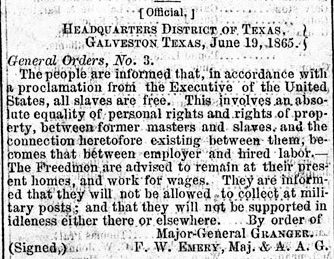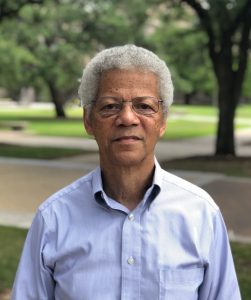Let freedom ring
Juneteenth, a merger of "June nineteenth," commemorates the abolition of slavery in Texas and much more, according to college's history professor.

By: Allen M. Junek ‘18
On June 18, 1865, when he and his 2,000 men sailed into Galveston Bay, Union general Gordon Granger was met with an unsettling realization: news of the now two-year-old Emancipation Proclamation had not yet reached Texas. Immediately the following morning, on June 19, Major-General Granger read his General Order No. 3 from the balcony of Galveston’s Ashton Villa, announcing the freedom of Texas’ enslaved population.

Dr. Albert Broussard of the College of Liberal Arts’ history department.
That was the first Juneteenth, a merger of the words “June” and “nineteenth” that commemorates the abolition of slavery in Texas.
“Really, Juneteenth and Emancipation can be used interchangeably, they’re part of the identity of southern black people,” said Dr. Albert Broussard of the College of Liberal Arts’ history department.
“What Juneteenth really signifies is not just celebrating the end of slavery, but African Americans also trying to figure out the meaning of freedom.”
Second to the Declaration of Independence, the Emancipation Proclamation remains perhaps one of the most American documents ever penned. Where the Declaration announced to the world the equality of all persons, the Proclamation echoed these principles by setting in motion the chain of events that would result in the liberation of the nation’s almost 4 million enslaved.
Aside from dealing a devastating blow to the institution of slavery and reaffirming the principle of equality upon which the country was founded, Reverend Dr. Martin Luther King Jr, at the centennial observance of the Emancipation Proclamation, said that one of the enduring effects of the Proclamation was that it gave slaves a role to play in their own freedom.
“What Juneteenth really signifies is not just celebrating the end of slavery, but African Americans also trying to figure out the meaning of freedom,” Broussard said.
Today, Juneteenth celebrations usually include readings of the Proclamation, musical ensembles, and religious services. In the spirit of Dr. King, many communities hold marches as both an act of remembrance and of discovery for what freedom means for black people today.
“For the same reason it’s important to celebrate the Fourth of July, it’s important to remember Juneteenth because slavery really is one of the great stains on this nation’s history,” Broussard said.
For more information about local Juneteenth celebrations in the Brazos Valley, click here.
Originally posted here.
